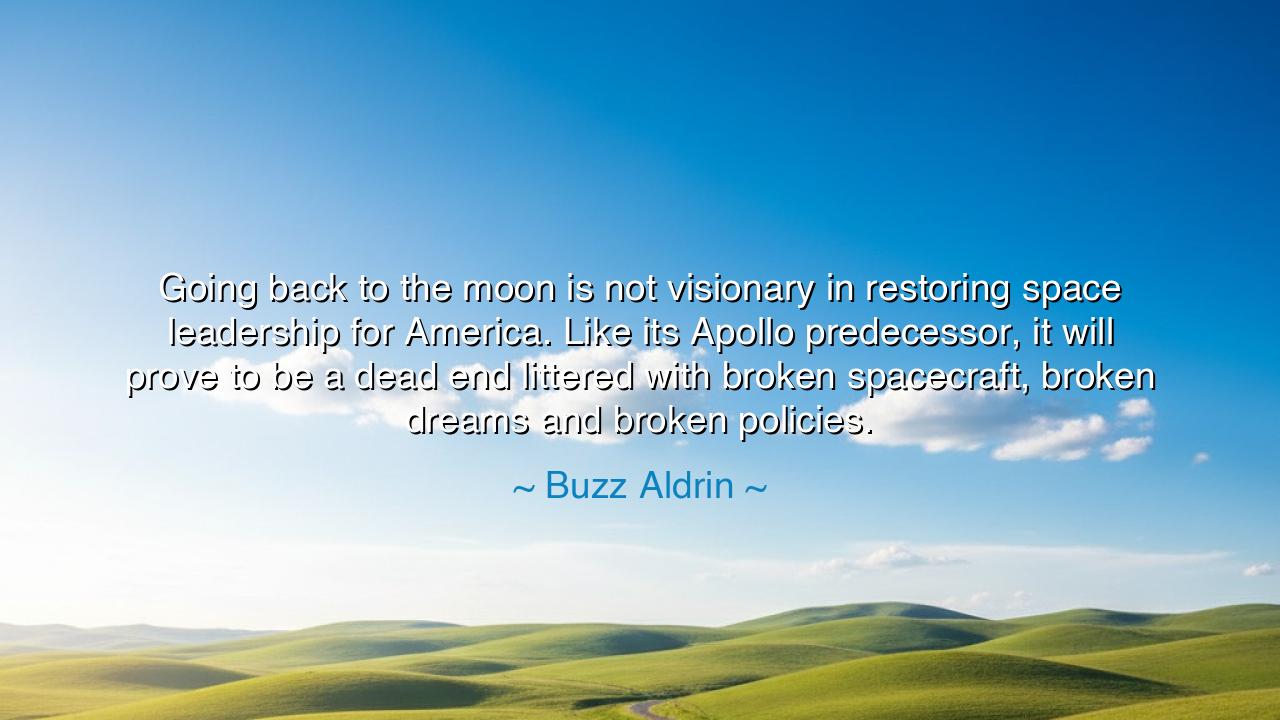
Going back to the moon is not visionary in restoring space
Going back to the moon is not visionary in restoring space leadership for America. Like its Apollo predecessor, it will prove to be a dead end littered with broken spacecraft, broken dreams and broken policies.






In the ancient world, great empires rose and fell, driven by visionary leaders who sought to expand their power and knowledge. Yet, history teaches us that true greatness does not lie in repeating the glories of the past, but in charting new courses, embracing the unknown with wisdom, and adapting to the ever-changing needs of the world. Buzz Aldrin’s words, “Going back to the moon is not visionary in restoring space leadership for America. Like its Apollo predecessor, it will prove to be a dead end littered with broken spacecraft, broken dreams and broken policies,” speak to this very truth. Aldrin, who himself stood on the moon, understood that while the Apollo missions were remarkable achievements, they did not represent a sustainable path forward for humanity's future in space.
The ancient Greeks, with their ever-expanding thirst for knowledge, sought not to simply revisit past triumphs, but to push the boundaries of what was known. Alexander the Great, though carrying the legacy of his ancestors, did not merely seek to conquer lands his forefathers had already touched, but aimed to create new realms, to build a world that was more connected, more enlightened, and more unified. Similarly, Aldrin’s critique is not an attack on the monumental achievements of the Apollo missions but a call to evolve beyond past triumphs. To go back to the moon, in his view, would be akin to a warrior fighting the same battle again and again, knowing that true honor lies not in repetition, but in progress.
Apollo 11 was a landmark in human history, a testament to the power of human will, intellect, and innovation. Yet even this victory, which saw Aldrin and Neil Armstrong become the first humans to step onto the lunar surface, was not a lasting triumph. The early missions to the moon, while extraordinary, did not lead to sustained progress or permanent settlement. Much like the Roman Empire, which conquered vast territories but failed to establish lasting unity, the Apollo program was a singular achievement without a deeper, long-lasting vision. The lessons of history show us that the greatest empires, the most enduring achievements, are not those that rest on past glories but those that evolve and adapt.
In modern times, the story of space exploration offers a similar lesson. Consider the story of the Hubble Space Telescope, which, after years of technical failure, ultimately changed our understanding of the universe. It was not simply the idea of exploring space that drove the project, but the understanding that to truly lead, one must be willing to embrace the unknown, to innovate, and to pursue a vision that will open doors to new knowledge. Aldrin’s reflection on returning to the moon suggests that stagnation, even when wrapped in the guise of nostalgia, will not restore America’s leadership in space. It is bold new steps into the unknown that will reignite humanity’s exploration of the stars.
Aldrin’s criticism also touches upon the human cost of such endeavors. When resources are devoted to revisiting past achievements, they often come at the expense of new discoveries and the real advancements that could propel humanity forward. Just as the Renaissance ushered in a new age of exploration, driven by a thirst for knowledge and a commitment to progress, so too must space exploration embrace the unknown, rather than returning to the familiar. The history of exploration—whether of lands, ideas, or space itself—shows that humanity thrives when it dares to push the limits of what is known and what has already been achieved.
The lesson here is simple but profound: true leadership comes not from repeating the past, but from building upon it and venturing into new realms of possibility. Aldrin’s call is one to embrace the future, not to dwell in the shadows of previous successes. Exploration, whether in space or in our daily lives, requires the courage to step into the unknown, to risk failure, and to be willing to grow beyond the boundaries we have set for ourselves. Innovation is the path forward, and it is only through new ideas, new goals, and new visions that we will continue to evolve and thrive as a species.
In your own life, take this wisdom to heart. Do not become complacent in the accomplishments of yesterday. Whether in your career, relationships, or personal growth, do not simply rest on what has already been achieved. Push the boundaries of what is known. Set new goals, seek new challenges, and be brave enough to move beyond the comfort of the familiar. Like Aldrin’s call to explore the stars, let your life be marked not by the repetition of past victories, but by the courage to boldly venture into the unknown, learning, growing, and evolving with each step. Only in this way can you find the true meaning of leadership and greatness.






AAdministratorAdministrator
Welcome, honored guests. Please leave a comment, we will respond soon